PREPOSITIONS
Prepositions are words which begin prepositional
phrases.
A prepositional phrase is a group of words
containing a preposition, a noun or pronoun
object of the
preposition,
and any modifiers of the object.
A preposition sits in front of (is
“pre-positioned” before) its object.
The following words are the most commonly used
prepositions:
|
about
|
below
|
excepting
|
off
|
toward
|
|
above
|
beneath
|
for
|
on
|
under
|
|
across
|
beside(s)
|
from
|
onto
|
underneath
|
|
after
|
between
|
in
|
out
|
until
|
|
against
|
beyond
|
in front of
|
outside
|
up
|
|
along
|
but
|
inside
|
over
|
upon
|
|
among
|
by
|
in spite of
|
past
|
up to
|
|
around
|
concerning
|
instead of
|
regarding
|
with
|
|
at
|
despite
|
into
|
since
|
within
|
|
because of
|
down
|
like
|
through
|
without
|
|
before
|
during
|
near
|
throughout
|
with regard to
|
|
behind
|
except
|
of
|
to
|
with respect to
|
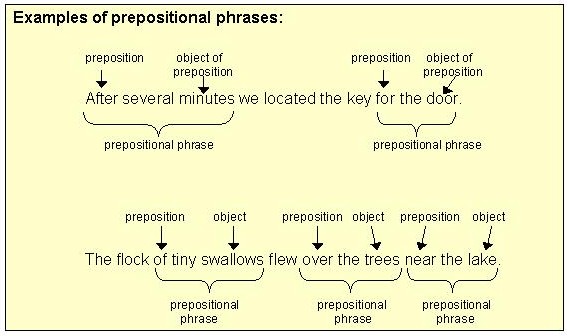
It is useful to locate prepositional phrases in
sentences since any noun or pronoun within the prepositional phrase must be the
preposition’s object and, therefore, cannot be misidentified as a verb’s direct
object.
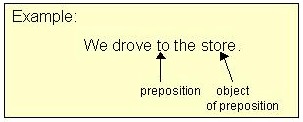
To the store is
a prepositional phrase.
Store is the object of
the preposition to, not the direct object of the verb drove.
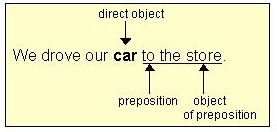
Car is the direct object
of the verb drove.
To the grocery store is
a prepositional phrase.
NOTE:
A word that looks like a preposition but is
actually part of a verb is called a particle.

Held up is a verb meaning
“to rob.”
Therefore, up is not a preposition,
and bank is not the object of a preposition.
Instead, bank is the direct object
of the verb held up.
To avoid confusing prepositions with particles,
test by moving the word (up) and words following it to the front of the
sentence:
Up the bank
four armed men held.
If the resulting sentence does not make sense,
then the word belongs with the verb and is a particle, not a preposition.
Note the difference:
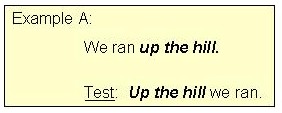
The resulting sentence makes sense.
Therefore, up is a preposition.
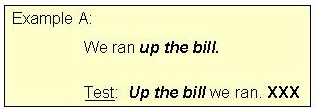
The resulting sentence does not make
sense. Therefore, up is a particle in this sentence.
The following examples illustrate the difference
between prepositions and particles:
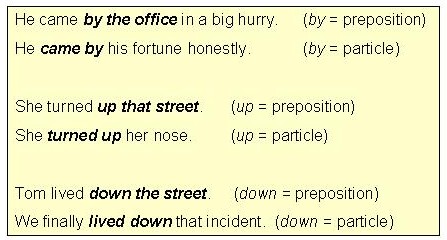
Some other examples of particles:
|
give in
|
turn in
|
pull through
|
wore out
|
broke up
|
|
go in for
|
put in for
|
bring up
|
found out
|
blow up
|
|
look up
|
make up
|
look over
|
|
|